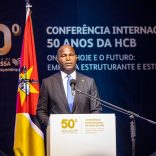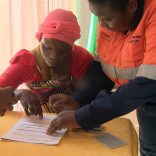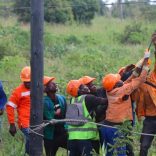Syrah resumes graphite shipments from Mozambique mine
Not very sensible to limit gas projects in Mozambique – IMF representative

Picture: Macauhub
The representative of the International Monetary Fund (IMF) in Mozambique, Alexis Meyer-Cirkel, this Wednesday ventured that it was sub-optimal to think about limiting the development of the country’s gas projects
“I don’t think that any move against those investments is very sensible,” Meyer-Cirkel said in response to questions from the public after an internet presentation on the country’s and the region’s economic outlook.
The IMF representative acknowledged that “climate change has obvious negative effects”, but its link to the consumption of fossil fuels “is a problem to be solved globally” and not at the expense of one country or another.
“Mozambique is a country that emits very little” carbon, in proportion to its population of 30 million inhabitants, and compared to other countries in the world, he said.
On the other hand, “the transition to renewable energy sources will take some time, and this transition can only be made with non-renewable sources, at least for a while”.
Alexis Meyer-Cirkel considered that “Mozambican gas is reasonably clean” compared to other non-renewable sources.
“I think that this discussion, an impediment to Mozambique developing its wealth, disproportionately penalises a country that has not contributed” like others “to the creation of the problem – and which is a poorer country”.
In 2022, Mozambique will start exporting liquefied natural gas from the Rovuma basin, where some of the largest reserves in the world were discovered. Gas is expected to play a key role in the Mozambican economy in the next decade.
At today’s event, Alexis Meyer-Cirkel reaffirmed the IMF’s forecast that Mozambique would grow 2.5% this year – with the gross domestic product (GDP) having already grown 1.78% to September, according to official figures.
During the first quarter of 2022, the report of the consultation to the country should be published in the scope of the ‘fourth article’ of the IMF’s statutes, which foresees consultations with the member states, even those without a financial program in force.
Asked by Lusa about whether a new [assistance] program might be signed in 2022, Meyer-Cirkel said that the IMF was “talking with the [Mozambican] government”, after it had shown interest in a “longer-term financing program”.
“The materialisation of a financial program will depend on dialogue and interest on the part of the government”, he concluded.
Despite having suspended support to the country in 2016, after the state’s US$2.7 billion ‘hidden debts’ came to light, the IMF lent the country €104 million in 2019 in support of humanitarian and reconstruction efforts after cyclones Idai and Kenneth hit.
After the Covid-19 pandemic was declared, the IMF provided €564 million in support to Mozambique, about half of it in a loan to be repaid “only after the production, export and tax revenues of liquefied natural gas start”, the organisation announced at the time.












Leave a Reply
Be the First to Comment!
You must be logged in to post a comment.
You must be logged in to post a comment.